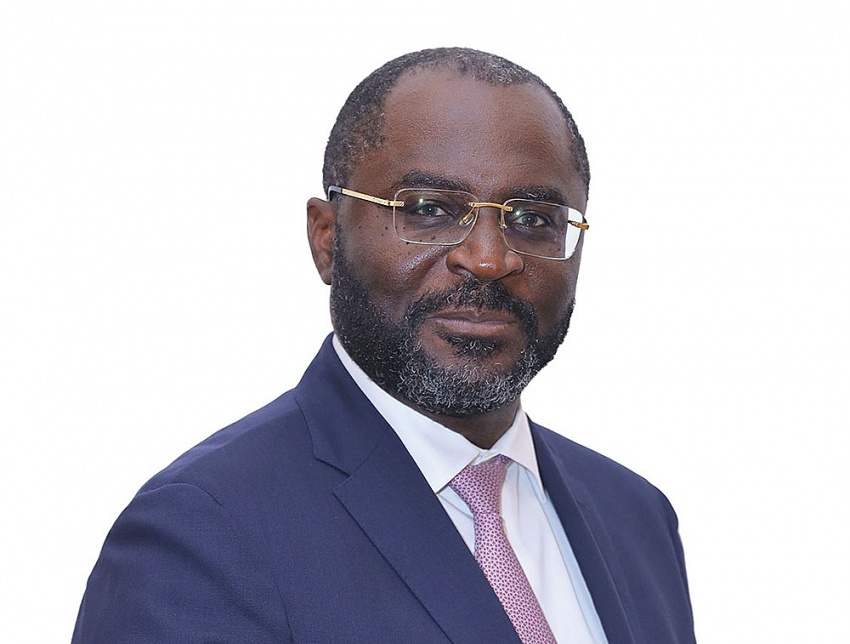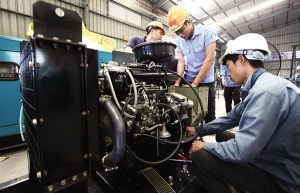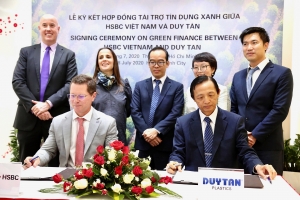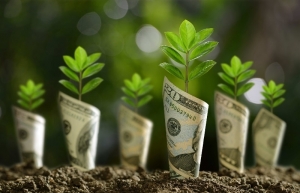Banks must be decisive in green financing mission
How do you assess the current state of the financial sector’s involvement in driving green transformation in Vietnam?
 |
| Allen Forlemu, the International Finance Corporation’s regional director of Financial Institutions Group for Asia-Pacific |
Climate finance in Vietnam is still in its infancy, representing only about 5 per cent of the total financing provided by Vietnamese banks today. Domestic financial institutions are in the early stages of their understanding of green bonds and other capital market instruments.
The State Bank of Vietnam (SBV) has played a proactive role. Notably, the SBV’s guidelines on managing environmental risks in lending and priority sectors eligible for green finance have significantly advanced the greening of the financial sector. Between 2016 and 2021, green credit has almost quintupled - 2.5 times faster than the average credit growth rate during this period.
The forthcoming Vietnam green taxonomy will also aid green finance development by identifying qualifying green projects for green investments. While there is a lot more to be done, with the strong leadership and commitment of the government and the financial sector, Vietnam is on the right track in advancing green finance to fund its transition to a low-carbon economy.
What are the challenges the country’s financial institutions face in responding to the growing demand for environmentally sustainable funding?
The financial sector, as the main credit provider, is vital for Vietnam’s transition to a climate-resilient economy, yet market conditions and financial institutions’ capacity for green financing need improvement.
As climate finance is at the early stages in Vietnam, domestic financial institutions lack capacity in environmental, social, and climate risk management and assessment of green finance opportunities. Of 85 credit institutions reporting to the SBV, 72 lack a dedicated business unit for green finance and 74 lack a specific procedure on green credit appraisal. Others have substantial challenges to developing green finance expertise and integrating green finance procedures into their existing operations.
Lack of bankable projects as well as well-defined taxonomies and standards have also hindered banks from finding truly green and commercially viable projects to fund. Another bottleneck is the mismatch between the short term of most deposits and the longer terms typically required by green projects.
It is also important to have a systematic and comprehensive assessment of the climate risks faced by the financial sector. For many financial institutions in Vietnam, physical risks of the portfolio are high and expected to grow, with about 55 per cent of total loans are to businesses and individuals in climate-vulnerable regions. These could have major implications such as deterioration of customer collateral and revenue streams, leading to a rise in delinquent loans to weaken the banks.
From your international experience, what should be the solutions to facilitate a green finance market in Vietnam?
The solution to climate challenges is three-pronged. It requires enabling public policy, development of technologies and innovation, and the development of markets for financing climate projects.
The government is aiming for carbon neutrality by 2050. This transition requires significant funding, and the Just Energy Transition Partnership offers an opportunity for Vietnam to secure up to $15.5 billion in international financing over the next 3-5 years. To make this happen, Vietnam needs to collaborate with partners to address regulatory and market barriers.
It is crucial to involve the development of market-based financial instruments like green equities and bonds, de-risking tools, and incentives for both lenders and borrowers. Additionally, strengthening environmental, social, and governance standards will engage international investors seeking sustainable assets.
An area of immediate focus for Vietnam is the issuance of a green taxonomy – something that ASEAN countries are also pushing forward. It is encouraging to know the Vietnam green taxonomy is at the final stages of review and approval and will be launched very soon. Mechanisms to assess climate-related risks in the financial system, including stress testing, will be helpful to evaluate climate risks of the entire portfolio as banks expand green lending.
What advice would you give to both investors and financial institutions seeking to be leaders in sustainable finance?
The sustainable finance universe is experiencing rapid growth, with increased interest from investors for upcoming thematic areas such as blue finance, sustainability-linked finance, and transitional finance.
The expansion of sustainable bond markets in ASEAN countries in recent years, $36 billion in sustainable bonds issued in 2022 alone, showcases governments’ push for green finance, as well as the high demand for sustainability-based finance projects from international investors. Deepening the capital market and developing the sustainable bond market will help Vietnam unlock this capital flow.
It is time for banks to take a decisive position. Those who act early and decisively in clearly defining their level of ambition and addressing the focus areas of their businesses, are very likely to establish themselves as market leaders.
Instead of following peers, a bank looking to win a large proportion of the market opportunity needs to proactively reallocating capital guided by sustainability targets, seize the potential of specific markets and business opportunities in focused sectors, and provide dedicated products and support to customers within those markets.
 | Green financing for small businesses Domestic and foreign small- and medium-sized enterprises in Vietnam will have a new financial source for their green projects in the country. |
 | HSBC Vietnam rolls out first green financing package for Duy Tan Plastics Recycling Today, HSBC Bank (Vietnam) Ltd. and Duy Tan Plastics Corporation signed a green credit agreement to finance Duy Tan Plastics Recycling Factory. The green loan, which is under HSBC’s commitment to provide $100 billion of sustainable financing and investment by 2025, is the first that HSBC arranges for a Vietnamese company. |
 | Euro banks offering green solutions European financial institutions are displaying their optimism about Vietnam’s sustainability path by fostering green financing alternatives, thus empowering the country to fulfil its net-zero carbon emission promise by 2050. |
What the stars mean:
★ Poor ★ ★ Promising ★★★ Good ★★★★ Very good ★★★★★ Exceptional
Related Contents
Latest News
More News
- Private capital funds as cornerstone of IFC plans (February 20, 2026 | 14:38)
- Priorities for building credibility and momentum within Vietnamese IFCs (February 20, 2026 | 14:29)
- How Hong Kong can bridge critical financial centre gaps (February 20, 2026 | 14:22)
- All global experiences useful for Vietnam’s international financial hub (February 20, 2026 | 14:16)
- Raised ties reaffirm strategic trust (February 20, 2026 | 14:06)
- Sustained growth can translate into income gains (February 19, 2026 | 18:55)
- The vision to maintain a stable monetary policy (February 19, 2026 | 08:50)
- Banking sector faces data governance hurdles in AI transition (February 19, 2026 | 08:00)
- AI leading to shift in banking roles (February 18, 2026 | 19:54)
- Digital banking enters season of transformation (February 16, 2026 | 09:00)

 Tag:
Tag:



















 Mobile Version
Mobile Version